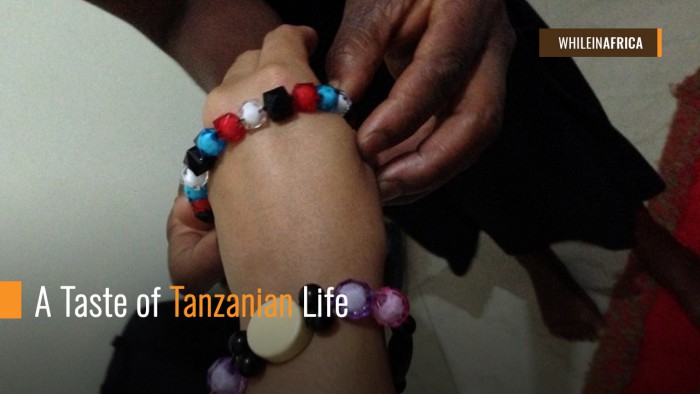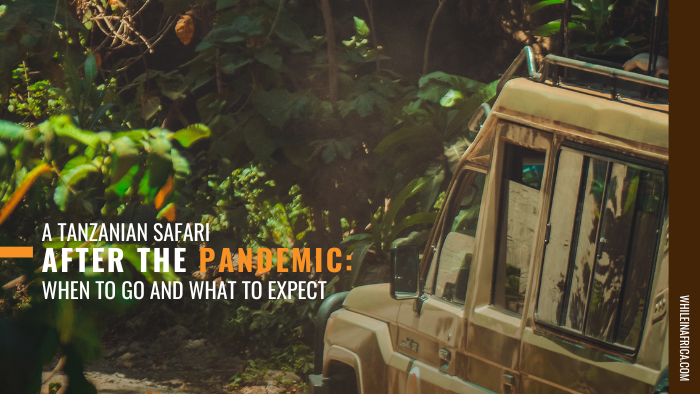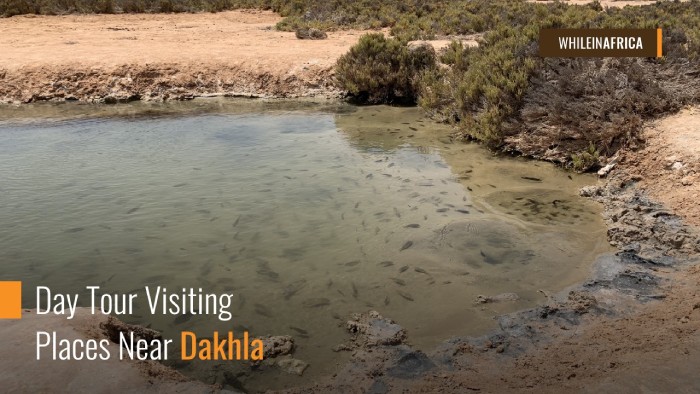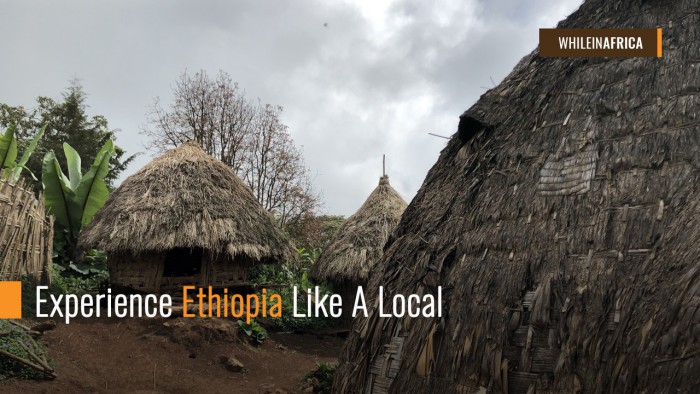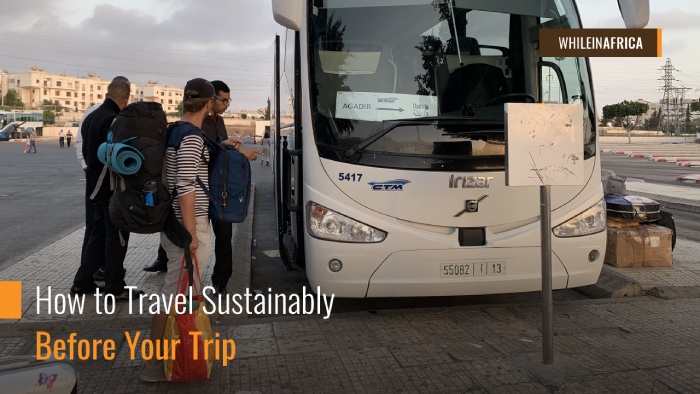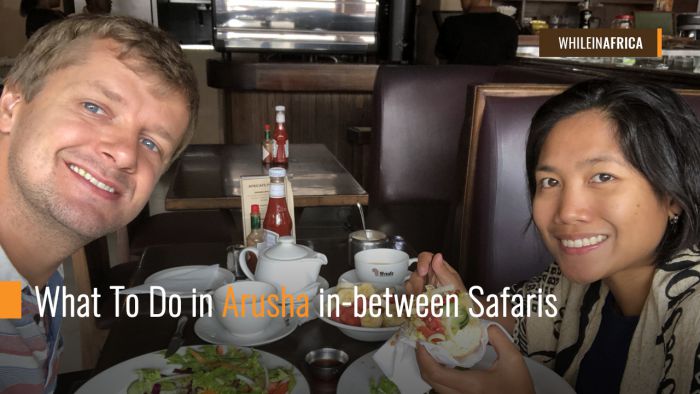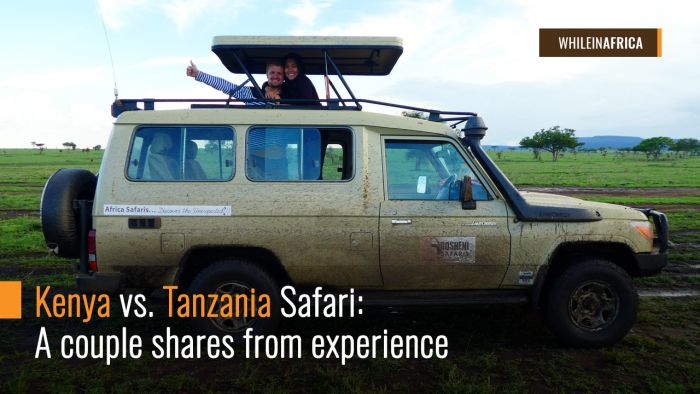Highlights
This was my first time in Africa and maybe like other foreigners who have never been to this continent before, I was a little bit paranoid too. First, because fellow travelers have warned me of the likely chances of getting raped or robbed. Second, the media is doing a great job in highlighting and maybe sensationalizing a lot of bad news about Africa such as the risk of acquiring e-bola, malaria, and HIV among other diseases; not to mention bombings and various terrorists attacks. Surely, these things are indeed happening in SOME African countries. SOME. Not all. Of course, it’s human nature for people to fear that which they don’t understand or know nothing about. I used to be that kind of person until I started traveling. Slowly, I gained perspective.
After having stayed for 2 weeks in Arusha, my assumptions were cured and I even felt bad for having thought of this country as unsafe especially after all the kindness and hospitality I have received from all the people I have met here.
Making direct volunteer proposals:
So I normally use a Workaway to look for volunteer listings. However, the vacancies posted for Tanzania are all about helping the kids, protecting them from abuse, and all other save the earth and its children volunteer tasks. I think these are all very noble causes but they charge a fee to volunteer for around 10 USD a day. This goes against my budget backpacking way of life. I also find it odd to pay to volunteer. More so, they require volunteers to stay for a minimum period of 1 to 3 months and I just can’t stay put in one place for that long.
So 2 months before my departure, I googled what kind of private businesses are operating in Tanzania. Being popular for their parks and wildlife, I found out that safari companies are operating side by side on the cut-throat competition. Thus, I researched for safari companies operating in Dar Es Salaam and Arusha and started marketing myself via ex-deal. I offered to help them in marketing, make a few articles and collaterals for them, and help improve their operations in general. In exchange, they would provide me with accommodation and meals for the rest of my stay. I sent my proposal to about 7 companies that I thought would be interested in judging from their online presence and website content. To my amazement, I got positive feedback from most of them in under 24 hours and they were all equally thrilled with my proposal. Later on, I learned that I am offering a good deal as it would be expensive for them to hire someone or pay for this kind of service somewhere else.
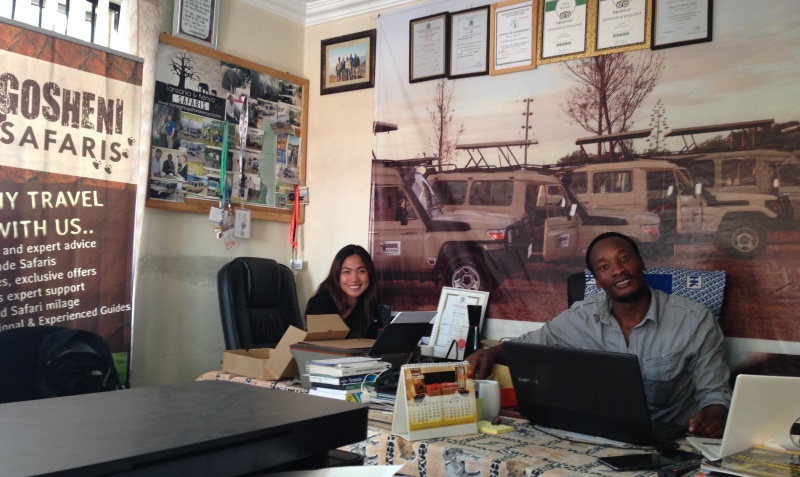
With my host/ employer, Managing Director of Gosheni Safaris
In the end, I settled with Gosheni Safaris Limited as the way the owner, Peter Roberts communicated his requirements made me feel that he has this vision for his company and needs me to make it come to life. I thought it would be best to work with a company that already knows what they need help rather than a company currently in chaos.
Volunteer Location:
Gosheni Safaris Limited is located in Arusha, around 4 hrs. away from the country’s capital, Dar Es Salaam. Arusha can also be accessed by an hour plane ride to Kilimanjaro International Airport. My host’s house is a small but very cozy two-bedroom apartment in Sakina road. It was very kind of him to refurbish the guest room as it used to be a storage area for their African safari camping equipment.
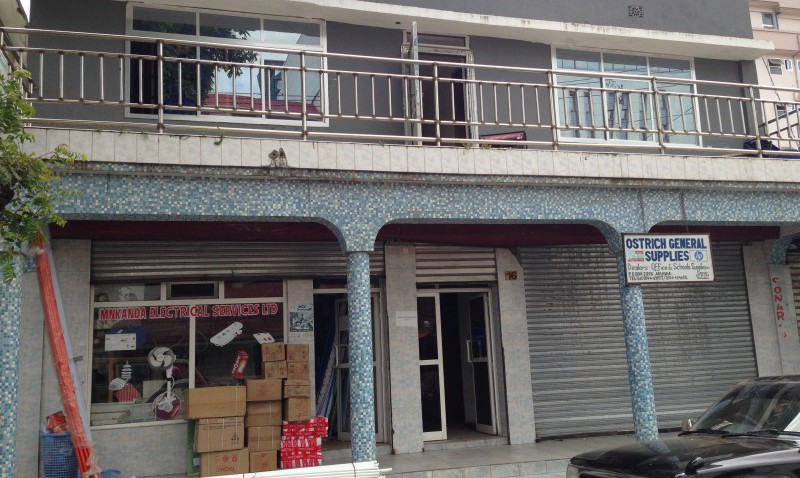
Building facade of my office in Arusha, Tanzania
From his house, it’s about 10 minutes’ drive to the office in Mosque Street beside Crowne Hotel. Addresses are very difficult to locate in Arusha. I haven’t even noticed any street sign nor house number, which makes up the whole “Address” thing. I guess being a small city, where everybody knows everyone, then it makes sense that everybody knows every place too. At one point when I tried to ask for the location or how I can reach this and that house, they gave me map coordinates! Looking at those series of numbers and periods… I knew at that instance that I’m already lost.
Fun Facts:
- Philippine soap operas are popular in Tanzania and these are dubbed in English. I was referred to as “Yna Macaspac” of “Pangako Sa’yo” every time I tell them that I’m from the Philippines
- Tanzanians and Filipinos have the same taste in soap operas. Sometimes, when I try to watch their local channels in Swahili, I don’t even need a translation to understand the plot. No wonder, a lot of Filipino series is a big hit here.
- Manny Pacquiao is equally popular in Tanzania.
- Arusha, Tanzania is very much like the usual less developed provinces in the Philippines: you hear the chicken choir early in the morning and the cricket sounds at night; the houses and establishments are of similar design and quality; a regular meal is made of rice, meat/fish, and a vegetable side; they like to eat with their bare hands too; the house decoration certainly feels like those you would normally see at your relative’s house in the province.
- When a meal from a bar or restaurant is about to be served, someone would come out with a small basin, soap, and pitcher, which she will serve with each customer to wash their hands with. Unless you ask, they don’t normally serve utensils as it’s common to eat with bare hands. After eating, the server would be back with the same handwashing set for you to clean your hands.
- Most, if not all of their rice meals come with Mchaicha, a green vegetable cooked with coconut milk or “gata” as we call it in the Philippines. It most certainly looks and tastes like “Laing” to me except it lacked the spiciness.
- This is a regular lunchbox meal, which you get if you order for take-out in a local eatery. In the office, this is what I usually have and it comes only with a spoon
Learning:
Living with the Basics
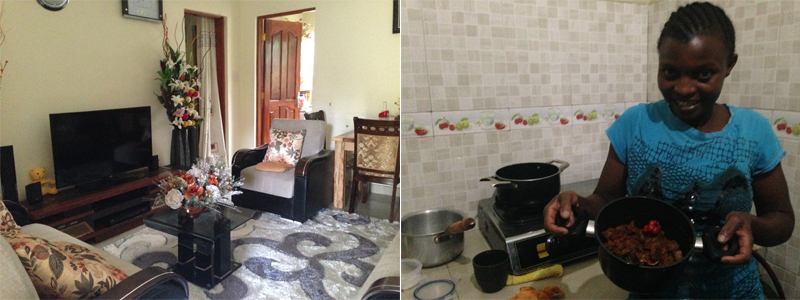
L: Still quite a very nice home of my host | R: Anna, the housekeeper prepares sumptuous Tanzanian meals every night!
The first time I arrived in Africa, I was welcomed with a warm “Welcome to Africa” greetings. Days later, I would hear the same statement in a rather sarcastic tone in one of the following conditions: when the power comes off, which was almost every day at times when you need it the most; when there’s a lot of work to do but there’s no internet access; once, when we ran out of water supply.
Belonging to the middle-class social level in the Philippines, and just naturally being a low-maintenance person, the Tanzanian way of life wasn’t in any way shocking to me but I could imagine how this must be disorienting for most European citizens and even for most Filipino friends, considering the kind of life they have been used to. Still, I have lived most of my life at ease and I expect electricity to be there just as I would expect that there’s always oxygen to breathe.
In the few days that I was here, happiness means having electricity for the whole night when I can do something productive with my laptop, or be able to use the heater and get a warm shower. Sure, I will not miss not having access to electricity but most certainly I will miss the feeling of being completely satisfied with the simple pleasures in life, often the most essentially taken for granted.
Friendly people
Tanzanian people are very friendly. They would call out “Mambo/ Hello” or “Karibu/ Welcome” when they see you and extend their warmest smiles, and a shaking hand when convenient. They would ask about me and my country. They would ask if I already had my lunch among other gestures to make sure that I’m doing fine. A colleague in the office, Hamish, introduced me to several very nice local people and places. One night, we went to the famous Via Via, which is a popular bar place for tourists. It’s a bit pricy compared to the local prices but it was worth experiencing, nonetheless. Another time, we went to a local bar called Bottom’s Up, which was a hidden spot frequented by the locals who certainly know each other. There I got to socialize with the locals of my age and have a taste of the local Tanzanian nightlife.
Hardworking people
My host, a very dedicated man, goes to work at 5 am or sometimes earlier. Sometimes when I’ve had enough sleep, I would try to follow his schedule. Oftentimes, I would fail that he would have to ask one of his drivers to pick me up at 8 or 9 am to drive me to the office. For two weeks that I spent volunteering for him, I hardly ever saw him rest. He wasn’t home when I go to bed, and he’s already outside by the time I wake up. Sometimes, I would slightly wake up to the sound of the door opening and I know that it’s him arriving from a meeting. My phone clock tells me it’s a little past midnight and so I go back to sleep. Three hours later, I would hear the door closing and I know he’s headed off somewhere related to work again. I have met a few other entrepreneurs who share the same outlook about work dedication. In their words, “if you sleep, and all your employees are sleeping too… then who would run the business for you?” With the stiff competition and difficult life here, I could imagine all entrepreneurs living Peter’s way of life or they would be easily left behind.
Indeed, Arusha is a city that never sleeps.

